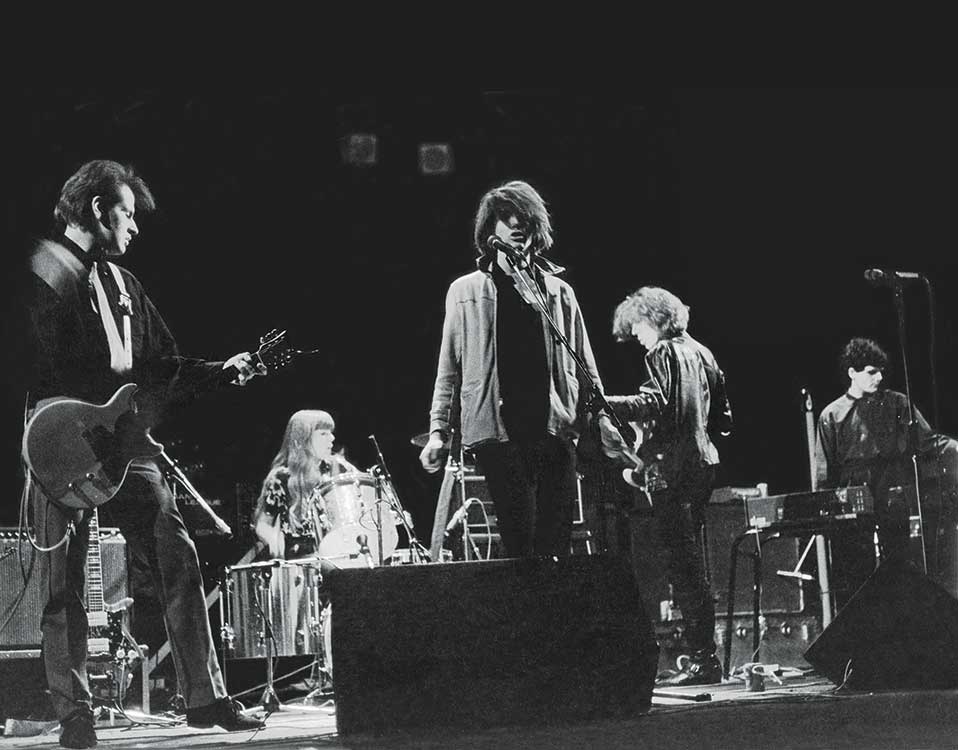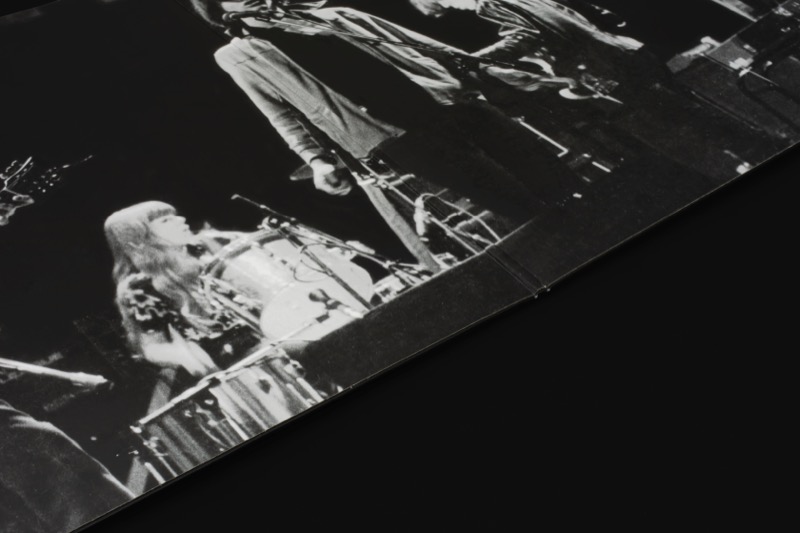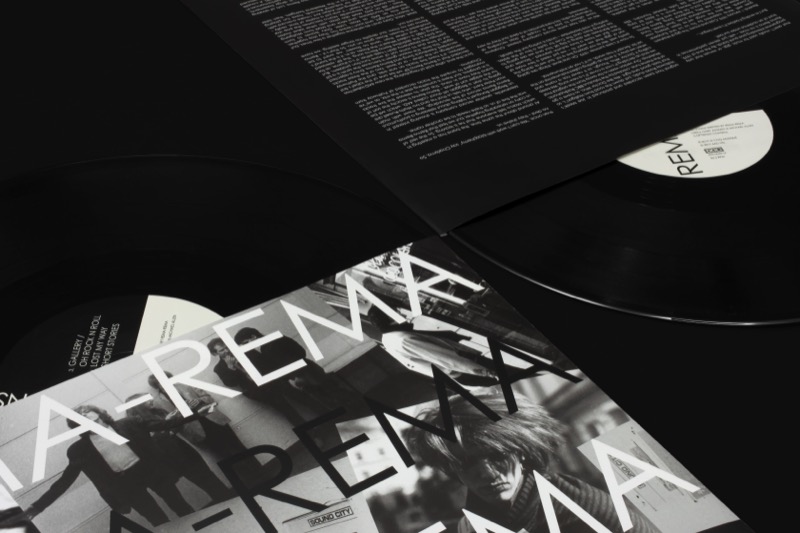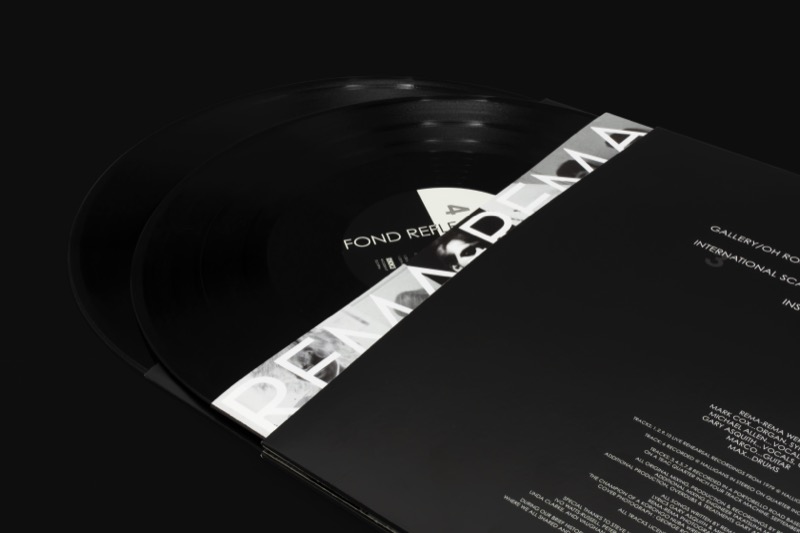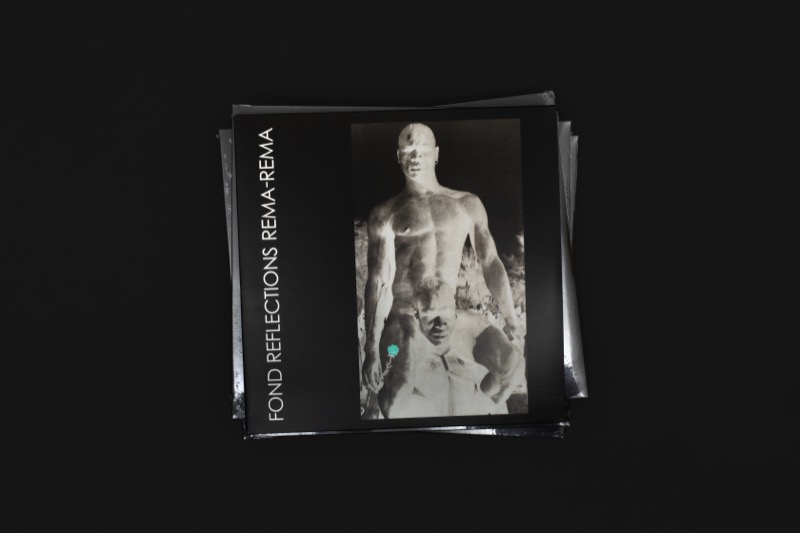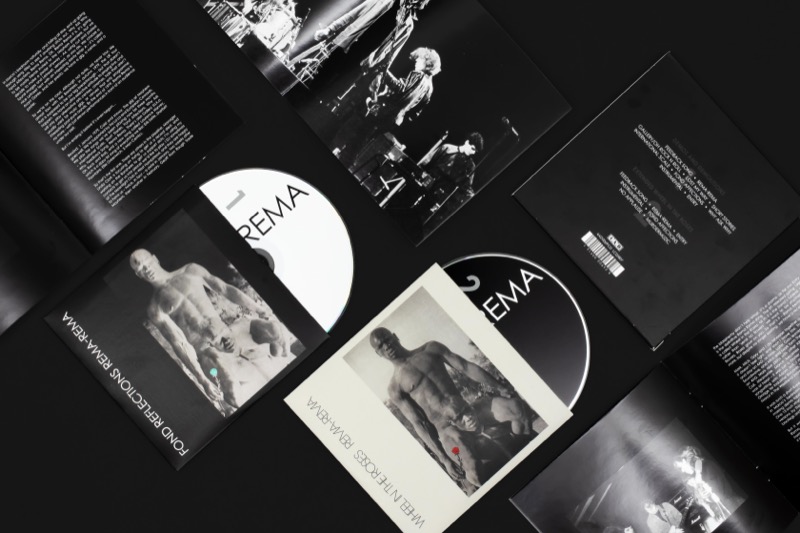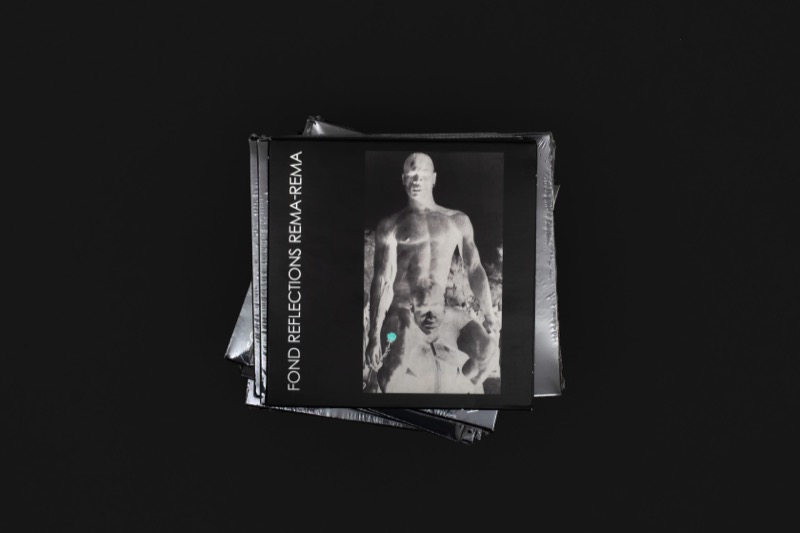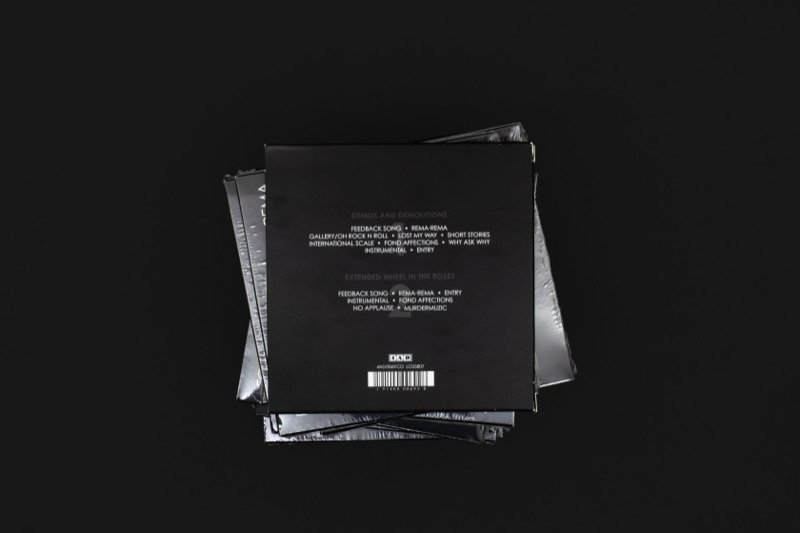Send No Flowers \ Rema-Rema \ by Martin Aston
Text-Only versionAs the saying goes, anticipation is half the pleasure.
And if the pleasure really does prove equal to the task, then everyone who has waited for a Rema-Rema retrospective will be thrilled to the core by the double vinyl/CD album Fond Reflections, released almost 40 years after their sole EP, Wheel In The Roses.
The EP was officially 4AD's first release, since the preceding four singles were under the label's original Axis imprint. By this point, punk rock's revolutionary spirit - cultural and musical - had waned, but its energy still propelled the more experimental and stylistically unshackled sound christened "post-punk" and the nascent flourishes of synth-pop. Rema-Rema threw both guitars and synthesisers into their caustic cauldron, forging distinctive shapes and moods; Wheel In The Roses sounded something like a gang out of A Clockwork Orange expressing itself through music, menacing and gleeful in equal measure, a by-product of the personalities involved and their desire to kick against the pricks - including what they heard as punk rock's limited toolkit, which three-fifths of Rema-Rema had partaken in as members of The Models, while guitarist Marco Pirroni had even been part of the first, impromptu, improvised Siouxise & The Banshees performance (as had future Sex Pistols bassist Sid Vicious).
Talking of limitations: everything Rema-Rema managed to record were demos, rehearsal or live shows, since they disbanded before they could officially organise a formal studio session. In fact, they'd even split by the time Wheel In The Roses emerged. But 4AD recognised something spirited and original in the Rema sound and vision: the lumbering pulse of 'Feedback Song' (prefaced by 35 seconds of howls and screams when it was included on the 4AD compilation Nature Mortes - Still Lives), a combative mood that spilled through a throbbing 'Instrumental' and a live take of a pounding 'Rema-Rema', which gave the band its name. A second live song, 'Fond Affections', showed a tender, melodic streak, though the mood was eerie and strained. The EP's artwork was equally layered: a 1949 photo of two imposing Nuba tribesmen in Sudan (by British photographer George Rodger) that bassist Mick Allen had doctored by drawing a tiny red rose between one of the men's hands - toughness and sensitivity intertwined.
Rema-Rema was officially over on 26th December 1980, according to synthesiser player and unofficial band archivist Mark Cox when Pirroni left, followed by drummer Dorothy 'Max' Prior. Allen, Cox and guitarist Gary Asquith subsequently formed Mass, recording the album Labour of Love before Allen and Cox started The Wolfgang Press (who were signed to 4AD for the next 12 years) while Asquith eventually forged ahead with Renegade Soundwave, signing to Mute Records.
But Rema-Rema didn't entirely disappear. 'Why Ask Why?' and 'Christopher', two live tracks from the Acklam Hall gig of April 26th 1979 appeared in 1981 on the cassette compilation, The Men With The Deadly Dreams (on the White Stains label). In 1983, 'Rema-Rema' was covered by US hardcore trio Big Black, and in 1984, one of the cover versions dominating This Mortal Coil's first album It'll End In Tears was 'Fond Affections'. Wheel In The Roses was reissued on vinyl in 1984 (and CD in 2003), but ex-members resisted 4AD's request to assemble a retrospective - they were more interested in new music rather than old (evident in Renegade Soundwave's electro-bassy update of the Rema-Rema track 'Murdermusic' on 1989 debut album Soundclash).
Fast forward to 2010, when old Rema-Rema cassettes emerged from Mark Cox's cupboard, and a slow process of re-evaluation and sporadic Rema releases began to trickle out - 500 7" copies of 'International Scale' b/w Short Stories' and then 'Entry' b/w its instrumental counterpart 'Exit' came with respective 2014 and 2015 editions of the fanzine Defiant Pose, and in 2015, Asquith remixed 'Rema-Rema' as Renegade Soundwave for a 12" under the title What You Could Not Visualise.
Now, with the help of archival photos, and extensive sleevenotes written by Rema-Rema drummer Dorothy 'Max' Prior, Fond Reflections visualises Rema-Rema, while 17 tracks of audio underline what's been missed all these years. Alongside the EP, there are alternate versions, the Defiant Pose tracks (minus 'Exit') and 'Why Ask Why', plus four titles unreleased in any form. If Wheel In The Roses was meant to provide a kind of funereal celebration - the run-out grooves read "Send no flowers (*Picture of a small flower*)" - then Fond Reflections is the joyous memorial. Rema-Rema is dead, love live Rema-Rema.
Origins


Gary Asquith: Mick and I were in the same class at Lascelles school in Harrow: we were chronologically thrown together by our surnames. My paper aeroplanes would whizz past his ears, and eventually he joined me at the back of the class. We were pretty rebellious. but nothing too serious! We were young insouciant idealists who didn't really take drugs, even in Rema-Rema, though when you listen, you might think otherwise.
I couldn't wait to leave the educational system. Mick and I stayed friends, but I wanted to make money, while Mick wanted to study art, so he went to art college. Cliff was also at our school with us, and he went off to art college with Mick, where Marco also attended.
Mick Allen: It wasn't art college, my dad wouldn't let me go because I hadn't done well enough at school, so I went to Lowlands sixth form college to get some O Levels, and thanks to my dad, I met Marco there.
Gary: During the mid 70's Cliff and myself worked Saturdays at a yacht chandler's called Captain OM Watts on Albemarle Street,Mayfair,Central London. We'd dye our hair,listen to glam rock music from the likes of Roxy Music,Jobriath, New York Dolls & Bowie and buy smart Italian style clothes from places like [men's fashion stores] Browns & Yves Saint Laurent with the proceeds of our labour. Marco was more devoted to "Too Fast To Live,Too Young To Die" which later became [Vivienne Westwood and Malcolm McLaren's Kings Road fetish shop] SEX. Cliff, had a Bowie fixation - he had to be more Bowie than anyone else, which eventually got the better of him [Fox sadly died, of a pneumonia, in 1986], but he was responsible for forming The Models with Mick, Marco and Terry (Day, drummer].
Mark Cox: I'd met Marco out in the clubs, places like Club Louise, where The Sex Pistols and Siouxsie hung out, where punks could go and not be hassled, where you could wear different clothes and make-up and dye your hair. There was none of that bullshit of acting tough. I spent a lot of time with Marco, not just out clubbing. None of The Models could drive, so I'd take their gear, and became their roadie, I did the same for The Banshees. I was always with Marco, and I soon became a member of The Models after they hired me a synthesiser, to see if it would revive the band because they felt they were losing impetus, and I'd make noises over their pretty songs. Marco showed me you didn't need to go to college for ten years to play music. I discovered Eno and his exploration of sound and became interested in rhythm, frequency and vibration.


Mick: It was a fantastic time, with all the energy and excitement of punk. But I realised early on that The Models weren't going anywhere. We were a third-rate punk band to start with. Marco was great and people took him seriously, but I wanted to be doing something challenging and special.
Mark: The final straw for the band was that Mick reconnected with Gary.
Gary: I'd go to the Beastly Cads/Models rehearsals and thought i should be doing something similar,so I formed a band and started rehearsing with my local delinquents. A leather jacketed Ramones looking outfit [named Manic and then Drama], and Mick came down to see us. He was disgruntled with The Models, he felt a bit disguised in the band, and he wanted to escape from Cliff's influence.

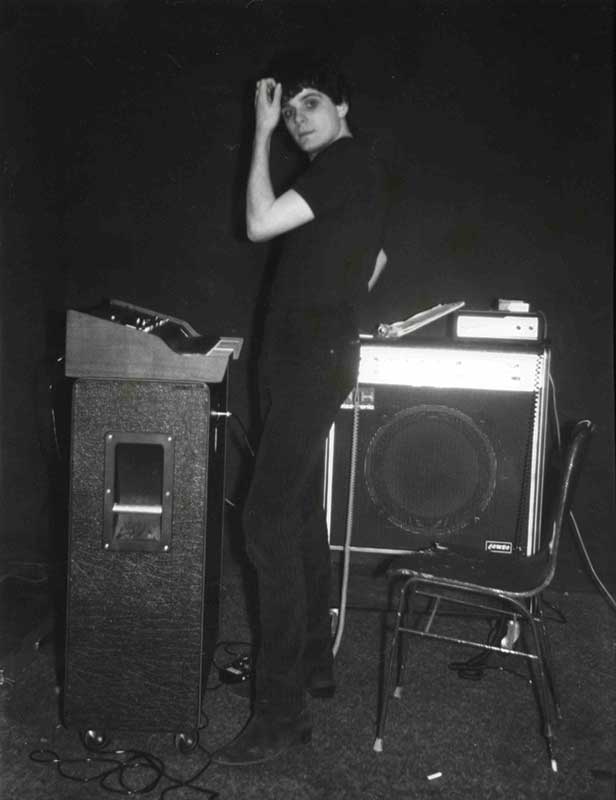
"There's music in our heads that no one's making."
Mick: Me and Gary worked one summer selling flowers on Sloane Square, and we talked about what sort of group we'd like to be.


Gary: What initiated it was, Mick came around with this song, 'Rema-Rema', which he played me on acoustic guitar, it was our first and probably our greatest song. So we wanted to do something together. Originally, we had a drummer, Gareth,who'd played with me in my previous outfit, but his heart wasn't in it. Then we called on Marco and Mark, and it built from there.
Mick: The idea was noise with a driving bass, and to keep it very simple. Maybe we spoke about tribal drums. It was mostly The Velvet Underground's imprint, how they used noise and feedback. So, the bass and drums are the immovable parts, and Marco just goes off, making marvellous noise, and Mark would do his discordant Eno-style bits. There was a lot of dub around during punk, and dub is very bass-centric. And Bowie, of course. I listened to 'Feedback Song' just the other day, for the first time in years, and it dawned on me how close it is to 'Station To Station', though it wasn't deliberate. It's about mashing up all those different things and taking it further, but some beautiful things also come out of that too. When you're young, you think no else has had these thoughts.
Gary: We'd often descend on Marco's parents' house, where Rema-Rema ended up jamming in his bedroom. He came from an Italian restauranteur background, and the fridge was always full! He was quite weight-conscious, and anti-drugs. We had different senses of humour, he had a drier wit, but we got each other.
Mark: We rehearsed for a year with a drum machine, a Minipops Junior, with pre-set rhythms. We didn't want a proliferation of rock drummers, but we'd noticed of bands like The Human League and Cabaret Voltaire were using drum machines, so we arrived at the idea of advertising for a drummer. The ad said "no hi-hat" and referred to The Velvet Underground, and that's how we found Max.
Dorothy 'Max' Prior [formerly of early line-ups of Adam & The Ants and The Monochrome Set]: I liked Kraftwerk and the Velvets, and never used a hi-hat, so that seemed fortuitous.
Gary: I think everyone was trying to get over punk, Marco more than anyone as he'd been more involved with punk, though Max had too, but a different thread, with the Ants and The Monochrome Set. We all liked Roxy Music, the Velvets, The Sex Pistols too, but we were preparing for something different. I think a lot of Rema-Rema's influence was Krautrock & Captain Beefheart, Mick's hypnotic basslines were a big part of it. We worked off each other's magic, a psychic identity, an energy.
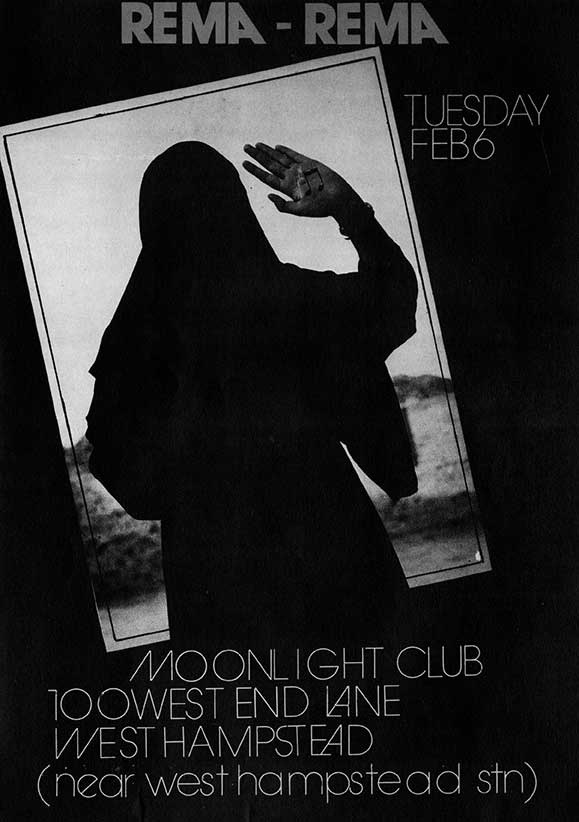

Max: There are already songs that Mick, Gary, Marco and Mark have started work on. One of them is called 'Fond Affections'. It has a lovely melancholy synth line that sounds a bit like whale song and mournful lyrics. I try a few different drum beats with it, but nothing feels quite right. In the end, I stick to a steady heart-beat bass drum beat with my right foot and a gentle bit of tambourine shaking. It's all it needs, so that's the way it stays. The boys in the band express approval - they seem glad to have found a Mo Tucker inspired drummer who doesn't feel the need to fill every bit of space. There's a very different song called 'Rema-Rema' - fast and beefy, with a repeated riff and rhythm that builds and builds. I put a big beat rhythm into the mix and it feels like we're there already. This one has Marco on lead guitar, as ever - that great big rich Gibson guitar sound with his Marshall amp on overdrive, all distorted by his state-of-the-art micro-phase guitar pedal and WEM Copycat - and Gary on rhythm guitar, playing a repetitive little riff filched from a funk song. Mick's voice is rich and resonant on this one.
Mark: The situation was, there's music in our heads that no one's making so we will have to ourselves. We couldn't copy anyone else. There was no compromise! This is our sound and it comes out like this.
Mick: I was always careful about what the subject matter of my lyrics were. I was listening to stuff like Leonard Cohen and the Velvets, who were coming from different perspectives and angles, I wanted the words to be interesting, , to say something that had longevity and meant something. I felt we got that with a song like 'Fond Affections', it's beautiful and fragile, and clearly written by a young man. 'International Scale' I think came from a period when I was using newspaper headlines, the way Bowie used William Burroughs' cut-up method.
"OK, Rema-Rema it is."
Max: New songs start in very many different ways. Sometimes there's a lyric - 'Bound for Glory', for example, which develops into something that has a fantastic great wash of guitar feedback running over and through it, so we always refer to it as the 'Feedback Song', which sticks. In a way, we've been happy not to perform live, just staying with the writing or rewriting and remaking of songs, music, noise, sounds or what you will. There's a lot now. We've already done some recording - at first at Halligan's with a Revox, and then (more ambitiously) in a basement studio in Portobello Road, armed with Hazel O'Connor's TEAC four-track.
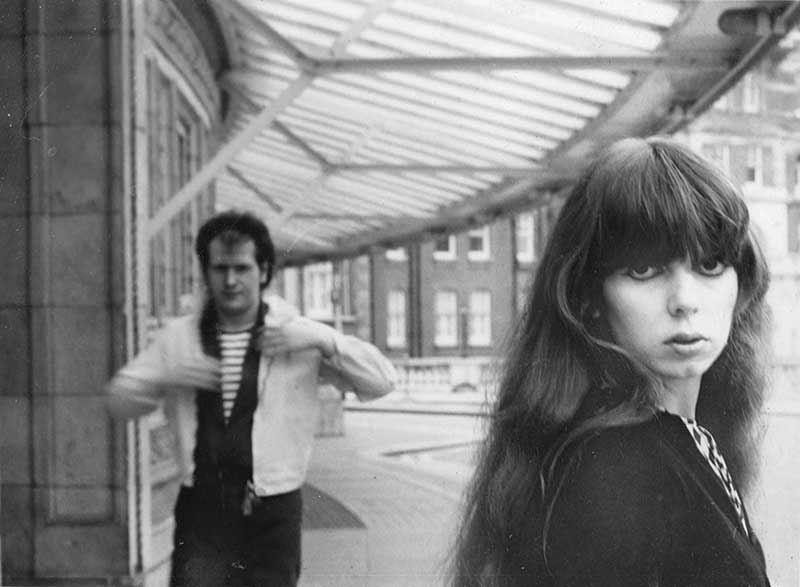
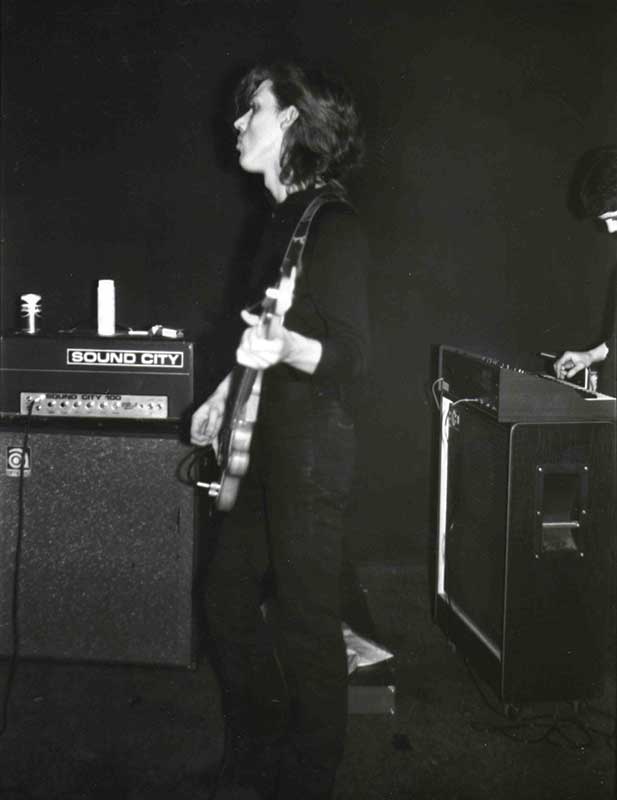
Mark: We called our rehearsal space Halligan's Heap. I remember Dire Straits were there too, before anyone knew who they were. Through the club scene, we met this woman, Linda Clarke. She was older than us, and she knew people. She worked for a guy who had stall in Portobello Road, restoring old leather jackets, and he had a basement that we were able to hire in September [978], the room with no name! Marco had the most knowledge of all of us, so he set up all the microphones.
Max: So here in our little den, we record everything we've got. 'Feedback Song' (aka 'Bound For Glory') segueing into 'Rema Rema'. 'Short Stories', a whimsical little ditty. The oceanic 'Fond Affections'. Then there's 'Why Ask Why', which has Mick's bass as the driver, Mark playing a one-note drone, and Gary on vocals - the five of us building a repetitive tribal rhythm up into a hefty wall of sound.
Gary: I don't think anyone really knew what they were doing. Our recordings were haphazard, the tapes were second hand, probably Hazel O'Connor had already used them. I think we met her through Mark, he was always giving people a lift. Like Sid Vicious one night, he was just there, and we were dropping him off. It was part and parcel of the times. Innocent times!
Max: The tape gets mixed at Hazel's flat in Swiss Cottage, and then taken to Tape Copying Services who make us little cassettes with TCS on the label, which all feels very professional. So we now have something to play to potential bookers and independent labels such as Rough Trade, who are mildly interested but don't leap at the opportunity to sign us, mostly because we've never played live! Eventually, we feel we're ready to meet our public. We've decided we are not going to play the usual music circuit, so are looking for more interesting possibilities. My friend Toyah has got herself a warehouse in Battersea Park, right next to the railway station, which she's called Mayhem, so Marco and I go and visit. We agree on New Year's Day - 1/1/79 - for our first live performance. We don't have a name, so we have a group meeting about it, in Marco's bedroom naturally, and failing all else, end up going through song titles to see if anything sticks out. 'Why Ask Why'. 'Fond Affections'. 'Rema-Rema'. OK, Rema-Rema it is.


Mark: I had suggested Manshaft, which is German for 'team', which is funny thinking about it now!
Mick: I really don't know where the name came from, I just remember playing the bass and that phrase came out, it just fitted the rhythm of the bass movement, it's no different to 'Be Bop A Lula'. I'd been going out with a Lindsey Reeman, but I don't know if that had anything to do with it.
Mark: Mick could say one thing one week, and then the opposite the next week, and be fully convinced about each answer, which I always enjoyed. And then to repeat the word Rema, bands hadn't done that yet. This was before the likes of Duran Duran, Nyam Nyam and The The.
Gary: Before Duran Duran, Simon Le Bon, who lived in Pinner [which bordered Harrow] had a band, Dog Dayz. Their name was written on the wall of North Harrow station, which I crossed out and wrote 'Rema-Rema'.
Max: It's going to be mostly friends invited to the Mayhem premiere, but we decide to make a poster anyway - A4, using cut and pasted found images and Letraset, xeroxed, as you do. We choose a nice Letraset font with an interesting slanty letter A - it's called Avant Garde. And hey presto, we have a gig, a name, and a poster.
Mark: "We played Mayhem with European Cowards, which included [future Ant] Kevin Mooney, and Tra La La, which was Eve [Adam Ant's first wife]'s band. There was a real camaraderie and a sense of purpose. We weren't interested in gigs or headliners or anything to do with rock'n'roll, we were interested in events, so a couple of times we played alongside a film in a cinema, like the Screen On The Green [in North London] with Things To Come, from the HG Wells book, starring Raymond Massey in a spaceman suit.


Max: By now, there are more songs, including the ultra-noisy 'Murder Music', and a slow, melancholic one called 'Christopher'. My favourite of the newer songs is called 'Entry'. It starts with a really lovely two-note wail from Mark's ARP Odyssey, and has a slow and repetitive bass line, with a drum pattern inspired by Native American rhythms. Plus call-and-response - or perhaps call-and-shadow, more accurately - vocals by Mick and Gary. Marco's guitar weaves an eerie wail through it all. Together, the tribal rhythm, electric and electronic sounds, and forceful litany of words create a piece of music that feels as if it describes or accompanies a shamanic ritual. Sometimes, not very often but occasionally, we do cover versions. Or interpretations, perhaps.
Gary: We rehearsed a version of Screaming Lord Sutch's 'Jack the Ripper'. I thought it was brilliant and Marco liked it too, but Mick said, 'We have to be different'. It's still a favourite of mine!
Mick: That was one of my least favourites. I don't have a sense of humour, you see.
Gary: Years later, I discovered that I'm related to Mary Ann Nichols, one of Jack the Ripper's victims!
Max: We like Doctor Who, so have a go at the theme tune...Our version veers so far away from the original that we end up deciding it's not a cover, it's a new song. We keep calling it 'Doctor Who', though, so it never has a name and when we play it, it ends up getting called 'Instrumental' on the set list. Except it has words, so it's not an instrumental.
Gary: We played the Rainbow Theatre with the Banshees and the Human League, that was our big moment. We were first on, but we had an audience and we went down really well. Bowie was at the side of the stage! Things moved fast for everyone. We nearly had a deal with Virgin, but they signed Magazine instead of us. Marco was frustrated. He was very pro-active and he wanted to go places, do things. That's why we rehearsed a lot and took things seriously.
Max: I'm spending a fair amount of time with Genesis P. Orridge and Cosey from Throbbing Gristle, and they talk to Colin from [promoters] Final Solution, who agrees to put us on the bill with TG and Cabaret Voltaire at the Central London YMCA. We almost tour, with the Banshees, in autumn 1979, the UK tour that is supposed to be our big breakthrough - but that doesn't happen.
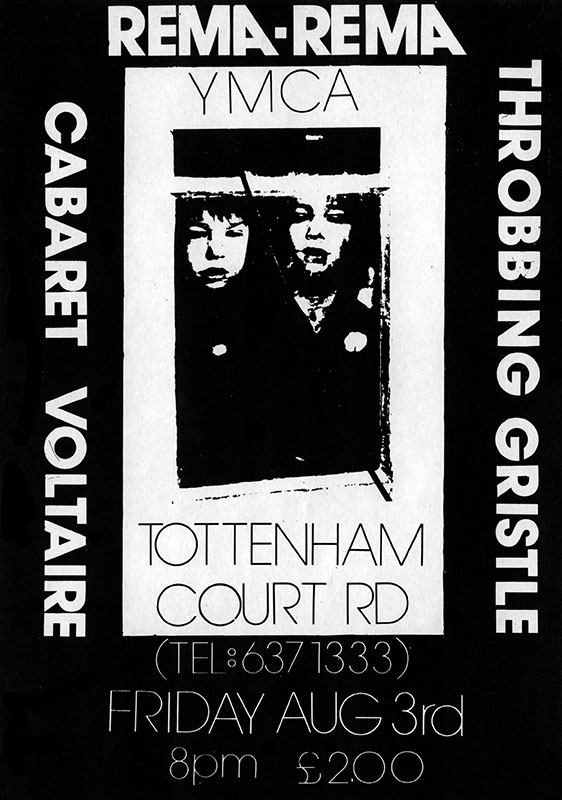
Mark: This would be us going up a gear, and playing outside London, but before we could join the English leg of the tour, which had started in Ireland, it was cancelled. [Banshees guitarist and drummer] John McKay and Kenny Morris had done a runner, and Linda had put them up in a safe house.
Max: Siouxsie asks Marco if he'll step in and help out by playing guitar on a few gigs, which he does - until The Cure's guitarist Robert Smith takes on the rest of the tour. But it all feels really weird, with Mark and Linda supporting John and Kenny, and Marco helping Siouxsie and co to keep the Banshees tour going. A tour which Rema-Rema, inevitably, have now been dropped from.
Mark: It was a huge downer, from 'we're going to do this!' to 'oh, it's not happening. For me, it was a crisis.
"We don't deal with blasphemy."
Max: We've also had some record company interest. Charisma have offered to pay for a couple of days recording at Pathway Studios. No hard promises of a deal, but they're very interested. So September and October are pretty down months for the band, with not much happening, and Marco more and more sure that he doesn't want to be doing this. He's now agreed to do some recording with Cowboys International, who Rema-Rema play with twice, at Brunel College in late October, and Kings College on the 1st November. We don't know it at the time, but this turns out to be our last ever gig.
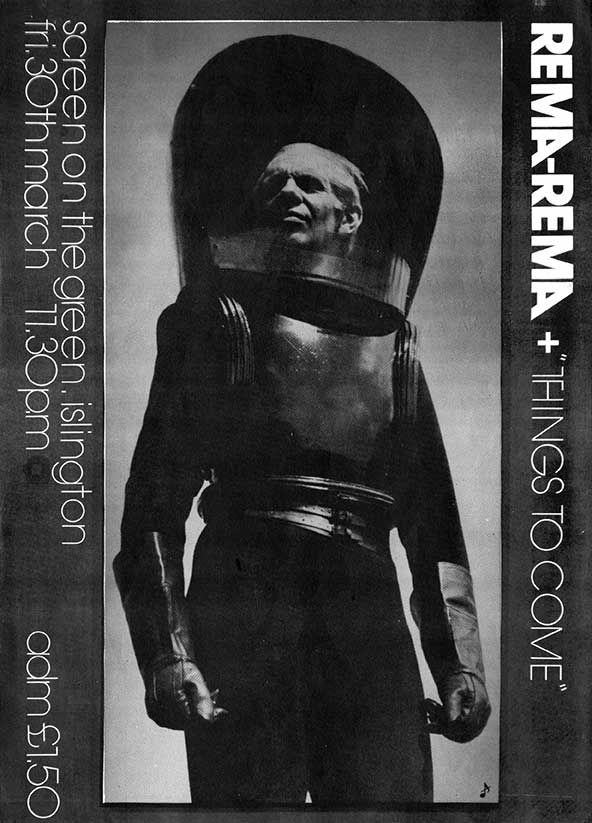
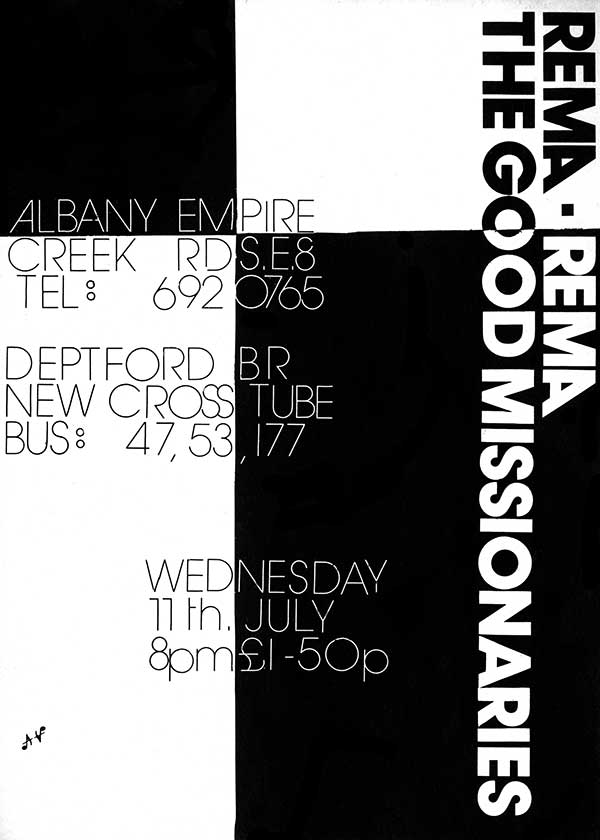
Max: Our dates at Pathway, paid for by Charisma, have been booked in for 13th and 14th November. We're adamant we don't need a producer. We feel we know what we want the sound to be, and don't want someone else dictating that, but agree to 'engineer plus' Wally Brill.
Mark: Wally was something to do with Mark Perry [Sniffin' Glue fanzine] who'd started a band, The Good Missionaries, who Rema-Rema played with at the Albany Empire, where we recorded our set on a mono cassette. We only recorded three songs at Pathway. Two were 'Feedback Song' and 'Rema-Rema'. The third was 'Entry'. Mick wrote the lyrics, and there was a line in there, "You fuck like Jesus Christ", they were pretty explosive lyrics. Charisma said, "We don't deal with blasphemy." There were a few fucks and "cunt" in 'Instrumental' as well.
Mick: I don't believe I was setting out to be deliberately controversial or offensive. I never write words down like Gary does, I just react to the music, and words come out. I'm not inclined to censor or edit myself afterwards, if there's something that I feel is a good line, or accurate, or a truth, I keep it.
"I hated post-punk, even though I was in a post-punk band."
Max: At around about the same time, the band has a meeting in which Marco tells everyone that he is leaving.
Mark: I felt Rema-Rema had started to veer into rock, which was more to do with Max and Marco They were getting more into rockabilly, with rock'n'rolly guitar, which wasn't my cup of tea, but it flowed out of Marco. Like 'Instrumental' didn't fit too well, and the other direction was the rest of us, a lot darker, which you can tell by what we did next. I was into experimenting with sound, I was exploring synths and organ with lots of reverb. Gary was a noise merchant too.
Mick: Marco's a great guitarist, but he wasn't interested in the kind of guitar we wanted. He liked his Bo Diddley and Link Wray, and that's what he went on to make, so Rema-Rema wasn't the path for him. I think 'Christopher' was the nail in the coffin, that was very dark and maudlin. And 'Fond Affections' was pretty heavy too. It didn't feel like there was much fun to be had.
Marco [from The Guardian, May 2016]: I hated post-punk, even though I was in a post-punk band. Actually, I hated the band I was in. And I hated Adam and the Ants [Adam's debut album], Dirk Wears White Sox, all that bollocks. Scritti Politti, gigs at the Acklam Hall, I hated it all. [It was] not as good as it thought it was, not as clever as it thought it was... banging on about credibility, going on Top of the Pops and acting like you're embarrassed to be there. If you're going to be a band, do it properly - you go on Top of the Pops, sell records, make a lot of money, have big cars. Don't fuck about acting like you're embarrassed.
Mick: Is Marco embarrassed by Rema-Rema I had no idea? We were nothing like Scritti. He was a massive fan of Bowie, the Velvets and Roxy Music, who weren't common-garden, what's he on about?
Mark: Within a few days of Marco leaving, he'd got together with Adam Ant and they became a formidable partnership that wrote global mega-hits.
Adam Ant [from Only Lovers Left Alive fan page]: I saw Marco in Rema-Rema, which was like one big feedback nightmare and I still thought he was good. He took Robert Fripp to the cleaners, to me Marco has for a long time been the best guitarist around.
Marco [from 3AM Magazine]: My only worry at the time was that the Ants were still perceived as a punk rock band. To be honest, I was a bit embarrassed by that -- it was 1979 and I thought it was a completely dead-end scene to be stuck in. The band had to break out of that ghetto… It was a deliberate move on both our parts to get away from that post-punk dour environment…That was the arty studenty stuff, and Adam was stuck with bootboy, Tennants lager punk rock. We wanted to completely get shot of all that and do something completely anti-it.
Gary: [Ants bassist] Kevin Mooney thinks that the best work Marco ever did was Rema-Rema, because we stretched him. Controlled feedback like Marco mastered is an art form. The last time we were all together [for a radio interview in 2014], he seemed so happy to see everyone, like we'd just finished a rehearsal.
"A sea change for 4AD."
Max: So the rest of us carry on rehearsing, but we feel that Rema-Rema was the five of us, so there needs to be another name. Meanwhile, another record company is showing interest in us: Beggar's Banquet is talking about releasing a posthumous Rema-Rema record of live recordings. We meet with main man Peter Kent, who tells us that he and Ivo Watts-Russell are going to start a Beggars off-shoot called 4AD, which will be for the edgier sort of work - Rema-Rema is exactly the sort of band they have in mind.
Mark: We were thinking of splitting up when Peter Kent approached us at a gig at Acklam Hall and said we could release something if we were interested. At the time, Rema-Rema were simultaneously scared and concerned by record companies, though we recognised it was part of releasing music. But we had ambition, which included getting a budget, to do more creative, artistic product, so we didn't take up on his offer. But then later on, Peter asked again, and this time we agreed.
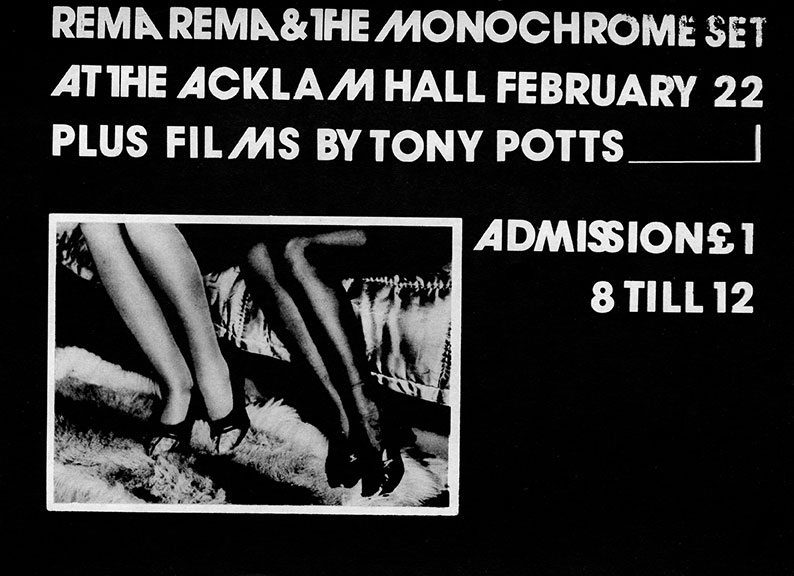
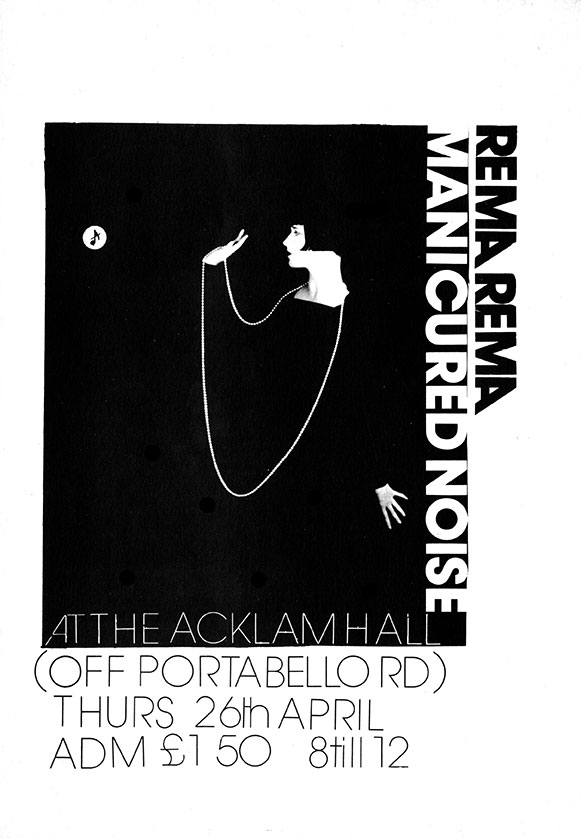
Peter Kent: I used to promote bands at Acklam Hall, and in Deptford, and Rema-Rema played both, and they became friends. When I played them to Ivo, he got it immediately.
Gary: The weird thing was, Marco still came to the 4AD meeting with us. I was upset that he'd left, but there was no animosity. Maybe he felt there was unfinished business. Or he just had to sign something so we could get something released.
Ivo: I understood punk much more after meeting Rema-Rema. They were real individuals, not aggressive, but they'd get in your face and argue their point. They believed in themselves, so you supported that even more than their music. Those people deserved support. When I heard their music, I knew it was a sea change for 4AD. It carried forward the idea that this little thing Peter and I had started would really mean something. Wheel In The Roses still stands out from that era. Hearing Marco's rockist guitar, wailing and screeching, but with very controlled feedback, over something that was so post-punk, was very unusual. One of the potentially great post-punk bands was over before it had even begun.
Max: The plan to release the live tracks is in progress, but there is something else in the mix, as we've managed to acquire the tracks recorded at Pathway from Charisma. So in the end, after a bit of negotiating, the new 4AD label has decided that a Rema-Rema EP will be one of the label's first releases. It'll have live tracks on one side, and the Pathway recordings on the other - or at least, two of the three tracks recorded, 'Feedback Song' and 'Rema-Rema' and 'Entry' is rejected again. This time, the reason given is because the synth is a bit out of time due to some sort of wave-function problem. But perhaps the blasphemy didn't help either. It's a shame, as for me 'Entry' is the definitive Rema-Rema song. The EP, released spring 1980, is called Wheel In the Roses, as in, it is the band's funeral, and rather than 'send no flowers', we want to be smothered in flowers. Roses grow on you. So that's it - Rema-Rema are no more, but despite no longer existing, we have a record out.
Mark: The title Wheel In The Roses was Max's, the sleeve was Mick's. He owned The Last Of The Nuba [a photographic book by Leni Riefenstahl']. The image was intense, there was something in those eyes, an energy, that fitted.
Send no flowers.
Max: Mark, Mick, Gary and I do rehearse together a few times, but it doesn't feel right, and soon I leave too. Rema-Rema is no more - with just eleven performances in front of an audience under our belt.
Mick: Without Marco, it was pointless, Rema was those five people. Max also had a need to express herself differently.
Max: I make a record with Genesis P. Orridge for Industrial Records, have fun playing punkabilly with Marco in The Weekend Swingers, then later join Psychic TV.


Gary: We didn't have a new batch of songs, but I'd learnt to play a bit more guitar feedback, and Max must have felt uncomfortable. I still think it's a shame she left.
Looking back, I still held a lot of disappointment with Rema-Rema, which had been the most important stage of my sordid career so far.
Mark: Rema split on December 26th, 1980. I didn't necessarily miss the band afterwards, I was again interested in finding something that didn't exist. I'd also developed a bit of a clash with Max - when I saw her years later, I was able to apologise, I was jealous because she was fluttering her eyelids at Marco, and they lived together for several years after that. The four of us were rehearsing, but we weren't feeling it, so it became us three without Max. and then we found [drummer] Danny [Briottet]. We'd written a new piece, called 'Mass', and that's what we called ourselves. Life felt complete for me. Marco was doing showcases for the Ants, and invited me and Mick. They played all those songs, we were like 'yeah, whatever, can we go now?' We weren't interested in pop, but the other.
Fast forward thirty years, to 2010...
Mark: I've lived in the same flat for over thirty-five years, and there was one cupboard I hadn't looked in for twenty years until I had a clear-out. In there, I found Rema-Rema tapes, nine four-track songs from the Portobello Road basement. It was a lovely little reminder of what we used to get up to. I had a tape from Halligan's Heap, and live versions and the Charisma demo. Wheel In The Roses has live recordings of 'Fond Affections' and 'Instrumental' from the Albany Empire and a couple of other tracks ['No Applause' and 'Murdermusic'] from the same concert were also the best versions we had. Gary's connections with studio people meant he could restore out the old tapes, and get them mixed.
Gary: When my mother died, I went back to my family home and found a stack of Rema-Rema flyers and handouts that Marco/Max and I had designed. I sold some on Ebay and Michael Clarke got in touch, saying he was a Rema fan, he had a label, Inflammable Material, and a fanzine, Defiant Pose, did we want to do an interview and include a single? We eventually ended up doing two singles using the old tapes.
I'd once sampled Marco's guitar between 'Feedback Song' and 'Rema-Rema' for Renegade Soundwave's version of Rema's 'Murder Music', to make Renegade Soundwave sound a bit like Rema-Rema, and I'd wanted to do a remix of 'Rema-Rema' for ages, so with the Eight-track tapes, I was finally in a position to do so. I stripped it down, and did what I did, it's Renegade Soundwave meets Rema-Rema, which I like. I called the 12 inch What You Could Not Visualise because it's a line from the song, and it's an unexpected collision.


Fond Reflections
We only started putting together Fond Reflections after 4AD had released In Camera's retrospective [Era, 2015], and we started talking to the label again. It's taken time because of contracts and stuff, but it's brilliant that it's finally come to fruition. It looks so tactile, and of its time, it speaks volumes to me about Rema-Rema! The recordings are what they are, they're mostly us playing live, to just ourselves. When you analyse them, they're so naïve - the vocals aren't separated, maybe a guitar solo has leaked in there, and some of the recordings aren't good enough to release, like 'Christopher', 'Jack The Ripper' and 'Laurence Harvey'. I currently like 'International Scale' the most, it's dynamic and powerful with a rock'n'roll heart, 'Why Ask Why' is great, it's a bit Krautrock. I really like 'Gallery' too.
Mick: When I'm interested in a band, I don't care where the music comes from, any scrap I can hear, I enjoy, regardless of the quality. But being the person involved [in Fond Reflections], knowing what those songs could have been, it's not something I would have released, apart from Entry the unrealeased songs are sketches. In a way, the fact we only ever had one record out was perfect, so Fond Reflections is a dilution of that perfectly formed piece. But I get that it may be interesting for people who are interested to hear what else we were doing, and it possibly gives a more rounded view of what we were about.
Gary: You can hear that Rema-Rema are well and truly on the road to Damascus with Fond Reflections and when you play the 3 Pathway recordings on the extended CD version of "Wheel In The Roses" you know we've arrived.
Mark: Rema-Rema weren't just copying what was fashionable, but creating something that might have a longer life, and here we are, all these years later.
Gary: I've been contacted by the skateboarding magazine, Thrasher, there's going to be a video of Ethan Loy, the poster boy of the sport, skateboarding to 'Rema-Rema', which is great, it's a young audience with a fresh set of ears, and it's appearing a couple of days before Fond Reflections is out. Perfect.
Max: It was such a short-lived thing, Rema-Rema. But it was always more than the sum of its parts, was Rema-Rema. Is Rema-Rema. I'm biased, I know - but I reckon it all still holds up 40 years on. It's something I've done that I'm proud of. It lives on. Take a listen.
